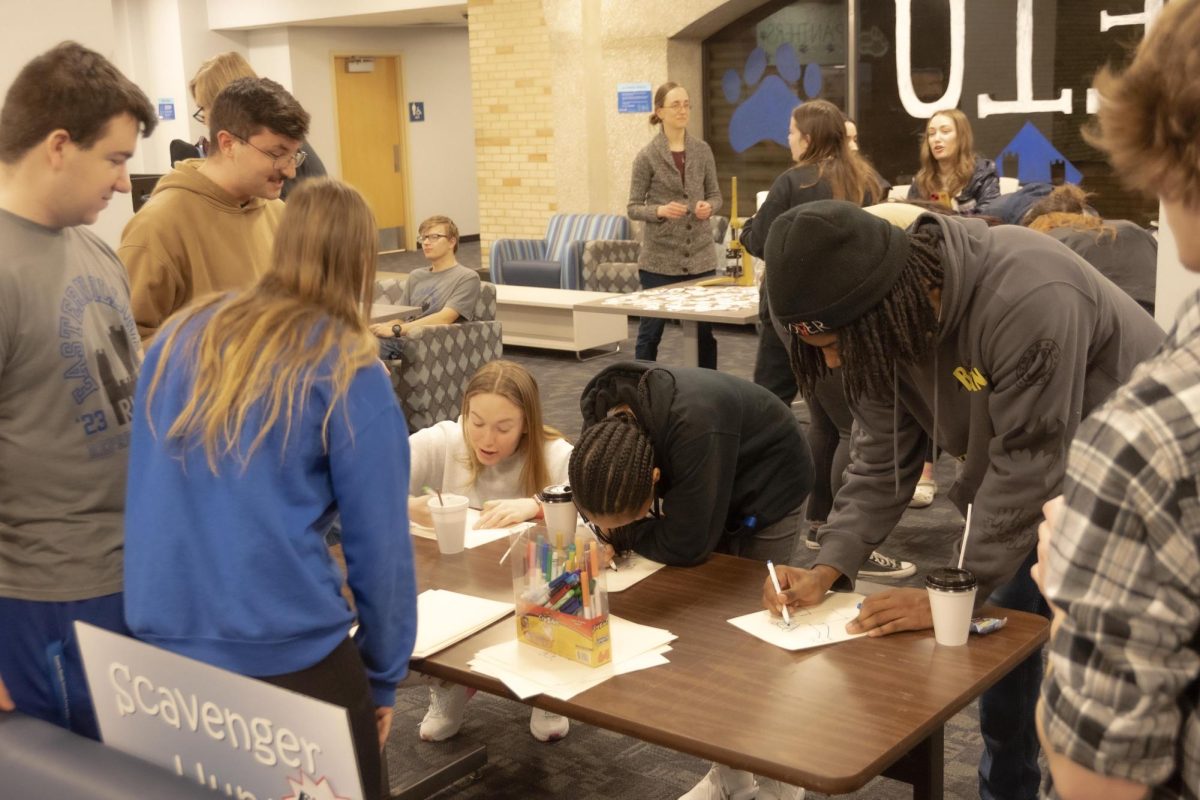College can be a challenging time, whether that would be getting used to the campus, trying to focus on classes or being involved with extracurricular activities.
However, there is an often-forgotten person for support and assistance that may be just a few doors down from your dorm room.
This would be a resident assistant, or, as most call it, an R.A.
Resident assistants are in charge of safety protocols on their floors and are also a resource for students as they navigate through their college years.
Terrell Steele, a hospitality and tourism major at Eastern, became interested in being an R.A. by joining Panther LEADS, an organization that plans events on campus for students throughout the school year.
“As I joined Panther LEADS, it gave me an opportunity to figure out what to do for the residents, how to make them feel at home for the first time here on campus,” Steele said. “It kind of got me like, now that I kind of got adjusted to like Panther LEADS, I want to be an R.A. because I want to help those who didn’t get the proper help like I did when I got to campus.”
This year is Steele’s first school year as an R.A. in Ford Hall and said the relationship between an R.A. and student residents takes time.
“I feel like they’re still warming up to me, you know, and that’s how it is for me already,” Steele said. “It just takes a while for them to warm up. I feel like over these last couple of months they’ve been really talking to me, and I’ve been forming a great bond with them.”
But while R.A.s are there to provide support for students during a stressful time, who is there for the R.A.s?
Steele said this is an aspect of the job that can become quite stressful throughout the year.
“I had to come up with my own programs every month, and, I’m not gonna lie, it can be pretty overwhelming sometimes. Especially like ,you got to balance this and balance schoolwork,” Steele said. “It can just be stressful if you just let it just pile up at once if you’re not just like being focused and scheduling your plans out accordingly.”
According to Steele, there can be a common stigma surrounding R.A.s that they are there just to police residents.
“The purpose of this job is, yes, we need to keep a lookout for the people here on campus, making sure everyone’s being safe, but we want to make sure everyone’s having fun here,” Steele said. “For me, I didn’t want to be an R.A. just to like get people in trouble. I want just to create a great environment where people can like come have fun or talk to me if they have any trouble or anything.”
Steele also said the job can sometimes be forgotten about by those on any college campus.
“I think for me R.A.s are pretty underrated in my opinion because they don’t know what it’s like to just constantly have to check the halls or be on call every single day you know just making sure that people are being protected,” said Steele.
This year is junior political science major Ashley Carrillo’s second year as an R.A., and she said she was intimidated by the job in the beginning.
“I was very overwhelmed especially because at training they just like throw a lot of things at you,” Carrillo said. “They literally tell you like worst-case scenario for everything. So, I was like, ‘Oh my God, is everything gonna happen like this?’”
R.A.s also have the responsibility of being on call for a certain amount of time, which is when an R.A. is tasked with being available and attentive to everyone in their building.
Carrillo is an R.A. at Lincoln Hall and said the most stressful part of the job can be the unexpected moments that can happen when on call.
“It’s definitely the last-minute conflicts that happen,” Carrillo said. “Say like, I’m on call and it’s like 2 a.m., and the phone rings, and like I have an exam the next day. And it’s already 2 a.m. I don’t know how to deal with that situation. I think that is always like the toughest part.”
According to Carrillo, those interested in becoming a R.A. should look for student connections rather than the monetary benefits.
“I definitely say don’t let the benefits overcloud all of the stuff that comes with it because housing advertises the benefits to get people to apply,” Carrillo said. “But I think a lot of people go into that and they’re like, ‘Oh, I didn’t know that it would be like this.’ I say, just consider that anything can happen.”
Drew Coffey can be reached at 581-2812 or at dennewsdesk@gmail.com.

![[Thumbnail] Eastern's Old Main was quiet Thursday morning while educators who had left the office to strike picketed outside.](https://www.dailyeasternnews.com/wp-content/uploads/2025/04/Strike_01_LT_O-800x1200.jpg)












![[Thumbnail Edition] Senior Foward Macy McGlone, getsw the ball and gets the point during the first half of the game aginst Western Illinois University,, Eastern Illinois University Lost to Western Illinois University Thursday March 6 20205, 78-75 EIU lost making it the end of their season](https://www.dailyeasternnews.com/wp-content/uploads/2025/03/WBB_OVC_03_O-1-e1743361637111-1200x614.jpg)















![[thumbnail edition] Assistant Coach of the Linebackers, Rodman Noel talking to the linebackers about their positions at O'Brien Field on the Eastern Illinois University campus, Charleston Ill.](https://www.dailyeasternnews.com/wp-content/uploads/2025/04/FB_24_O-1-e1744671213207-1200x609.jpg)










































